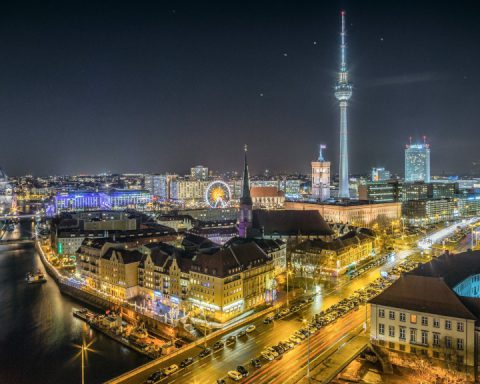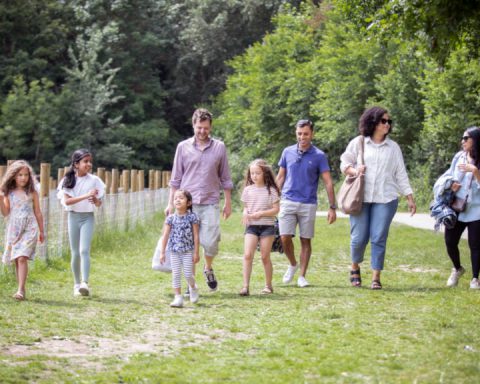Our Bridges of (Com)passion series today highlights Sandra Janzen, a bi-ethnic, entrepreneurial Canadian living in Leipzig. For its short period of existence, her café Canada House in the Reudnitz quarter managed to leave its mark in people’s lives. Her place was beautifully furnished, cozy. The guests were privileged to sample traditional Canadian cuisine and experience the country’s spirit, of which the beautiful lady with blond curls is a full-hearted embodiment. Some weeks ago, young journalists Frida Rucker and Lucie Klose, Class 9, had an insightful Q&A with Janzen, which we reproduce here. In it, she candidly discusses a number of cultural similarities and contrasts between her first and second homes. – Svetlana Lavochkina

Q: How long have you lived here? What was the reason for your moving to Leipzig?
A: I‘ve been here about three years. My father was born in Germany and he died when I was young, so I have a connection to Germany and I have always wanted to live in Europe. I thought it would be easier to integrate when I came to Germany because I have German roots. I chose Leipzig because it is one of the fastest-growing cities in Germany, so I thought it would be a good place to start a business.
Q: How many languages do you speak?
A: Basically one, but I can speak a little bit of French and a little bit of Spanish, enough to get by, and a little bit of German.
Q: What are the similarities and differences you perceive between Canada and Germany?
A: Well, let’s start with what is the same. Good things: most Canadians are law abiding. Most Germans don’t break the law either. Courtesy, I would say, respect for women, gender equality. Potatoes and French fries. And there are three big differences.
First, Germany is more socialist and Canada is more capitalist. For example, I have three kids. I had my first child at 17 and I didn’t get any help from the government, so I had to take a student loan; they just said, “you should have thought about it before.” So I had to go to work, they didn’t care. In Canada, if you have three kids and they are all young, you can’t stay at home and get Hartz IV. They just say, “okay, we pay for the state daycare, so you have to go to work, however poorly paid.” So you can imagine it’s a very, very difficult system for young mothers. So that’s the biggest difference.
The second thing: People here in Germany are less judgmental. For instance, every German I’ve met in the last three years, having heard I have a 26-year-old daughter, said something like “Oh, you are a young mother, how nice.” In Canada and the US, the first question is, “were you married? Did you want to have a baby at such a young age?” They ask very personal questions, questions to judge you. Not everybody, but most; we have more Christian roots and stereotypes. In Germany, nobody cares whether you are married.
On the other hand (difference number three), Canadians are more open, more friendly, spontaneous, ready for fun. In Germany, everything is a market of appointments. We Canadians don’t make appointments to have fun. Germany is very rule-focused and the customer service is sometimes really awful. Canada is more fun, more multicultural, expats are integrated better. After two years of life in Canada, expats start identifying themselves as Canadians, whereas in Germany, those not German-born will always remain foreigners.
Q: How do you practice your Canadian culture here?
A: Well, in small things, like being easy-going. For example, someone breaks a cup in my café. I say, no problem, it’s fine. In this situation, Germans would say, “Oh, I just bought this cup!” – and they make you feel bad. This is an accident, right? So this is how I try to practice it, easy-going, we don’t worry about petty things. Also, I guess, another big difference is, because we are Canadians, we talk more openly. We don’t shy away from joking about different nationalities, including ourselves. Here in Germany, this is taboo, and you risk being called a racist.

Q: Do you have any connection to your Canadian family or friends?
A: Oh yes, every week. I think people like close family members, even if you haven’t seen them for ten years, you are still so connected that when you do meet up, it seems like you only parted yesterday.
Q: Can this country be your second home?
A: Yes, it always feels like a second home. I grew up with this kind of feeling, half British, half German. But my first home is Canada, I’m totally Canadian.
By Frida Rücker and Lucy Klose, Free Waldorf School Leipzig









